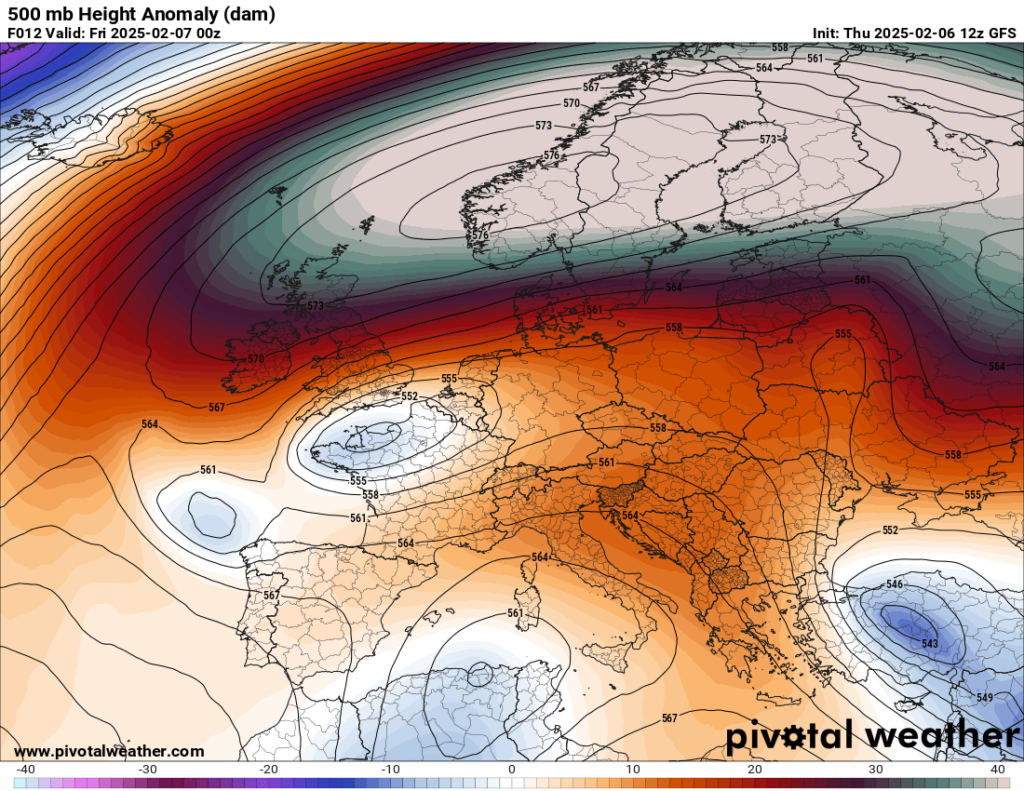The main purpose of this ongoing blog will be to track global extreme, or record temperatures related to climate change. Any reports I see of ETs will be listed below the main topic of the day. I’ll refer to extreme or record temperatures as ETs (not extraterrestrials). 😉
Main Topic: Extreme Warmth at the North Pole
Dear Diary. Lately I’ve noticed a lot of record warmth either currently in high latitudes or forecast at high latitudes. This short-term forecast for Europe and Scandinavia is eye opening:

Heights of 576+ decameters at 500 millibars climatologically are summer like halfway up through the atmosphere over Norway valid for Friday.
Looking at climate reanalyzer data, anomalously warm air persists over the North Pole, in this case well above freezing when air there is typically well below 0°F during early February. This is one more indication of a climate that is getting more unstable each year.
Here are more details from the Guardian:
Temperatures at north pole 20C above average and beyond ice melting point
Scientists say unusually mild temperatures linked to low-pressure system over Iceland directing strong flow of warm air towards north pole

Scientists say they expect the Arctic Ocean to lose sea-ice cover in summer for the first time over the next two decades. Photograph: Jose Luis Stephens/Alamy
Ajit Niranjan Tue 4 Feb 2025 11.39 EST Share
Temperatures at the north pole soared more than 20C above average on Sunday, crossing the threshold for ice to melt.
Temperatures north of Svalbard in Norway had already risen to 18C hotter than the 1991–2020 average on Saturday, according to models from weather agencies in Europe and the US, with actual temperatures close to ice’s melting point of 0C. By Sunday, the temperature anomaly had risen to more than 20C.
“This was a very extreme winter warming event,” said Mika Rantanen, a scientist at the Finnish Meteorological Institute. “Probably not the most extreme ever observed, but still at the upper edge of what can happen in the Arctic.”
Burning fossil fuels has heated the planet by about 1.3C since preindustrial times, but the poles are warming much faster as reflective sea ice melts. The increase in average temperatures has driven an increase in fiercely hot summers and unsettlingly mild winters.
Julien Nicolas, a scientist at the EU’s Copernicus Climate Change Service, said the unusually mild temperatures in the depths of the polar winter were linked to a deep low-pressure system over Iceland, which was directing a strong flow of warm air towards the north pole.
Extra-hot seas in the north-east Atlantic were strengthening the wind-driven warming, he added.
“This type of event is relatively rare, but we are not able to assess its frequency without further analysis,” said Nicolas. “We are aware that a similar event occurred in February 2018.”
The Copernicus data showed daily average temperatures were more than 20C above average near the north pole on Sunday, with absolute temperatures above -1C as far north as 87°N.
The findings were confirmed by an Arctic snow buoy, which logged absolute temperatures of 0.5C on Sunday.
Climate scientists estimate global temperatures through the re-analysis of billions of weather measurements from satellites, ships, aircraft and weather stations. But in remote regions such as the central Arctic, where there are fewer direct observation sites, it was “difficult to estimate the exact temperature anomaly”, said Rantanen.
“All the models I have seen indicate a temperature anomaly over 20C,” he said. “I would say 20-30C is the order of magnitude.”
The Arctic has warmed nearly four times faster than the global average since 1979, and extreme heat has become hotter and more common.
Temperatures rising above freezing are of particular concern because they melt ice, said Dirk Notz, a climate scientist at the University of Hamburg. “There is no negotiating with this fact, and no negotiating with the fact that the ice will disappear more and more as long as temperatures keep rising.”
A study Notz coauthored in 2023 found Arctic summer sea ice would be lost even with drastic cuts to planet-heating pollution.
“We expect the Arctic Ocean to lose its sea-ice cover in summer for the first time over the next two decades,” said Notz. “This will probably be the first landscape that disappears because of human activities, indicating yet again how powerful we humans have become in shaping the face of our planet.”
Here are more “ETs” recorded from around the planet the last couple of days, their consequences, and some extreme temperature outlooks, as well as any extreme precipitation reports:
Here is some new January 2025 climatology (More reports are archived on prior daily February 2025 posts.):
Here is More Climate News from Thursday:
(As usual, this will be a fluid post in which more information gets added during the day as it crosses my radar, crediting all who have put it on-line. Items will be archived on this site for posterity. In most instances click on the pictures of each tweet to see each article. The most noteworthy items will be listed first.)